
Fig. 31. A Sketch near Luneville
S. S. A.----CONVOY NO. 3
(SECTION SANITAIRE ANGLAISE)
IN most houses there is an odd room which becomes a haven for unconsidered trifles and rubbish; so it was with the villa in which our convoy was billeted at Gérardmer. There was the attic, an unthought-of corner up among the rafters, which drew me to its bosom as it were by instinct, and at once I partook of its homely hospitality and shared the limited space with the water cistern and loose ends of things in mouldy boxes---all sorts of unsuspected remnants, from cracked mirrors and metal fittings to damaged dolls and broken blinds.
It was a prosaic enough attic when I arrived, but in a short time it assumed a new aspect: something in the way of a Cinderella-like transformation took place. The rough-hewn rafters were handy for pinning up sketches , the small portion. of flat wall space was soon completely covered with gay and even saucy pictures from the French comic papers. A few yards of white calico cleverly concealed the unseemly heaps of rubbish and at the same time furnished a tempting surface for original decoration; indeed it was soon covered with naive but ambitious subjects, bravely undertaken and highly-coloured. Good old Percy Tarbutt, who always persisted that Art was a mere matter of luck, gave frequent demonstrations in support of his theory. He had quite a passion for drawing ships, and a great trial they were to my sailor-nature. His real masterpiece was a female figure, drawn with a lump of coal; it eventually became the principal feature of a scene on Margate sands.

Fig. 31. A Sketch near Luneville
The small window, if it was unsatisfactory for purposes of light, at least proved useful for discharging cinders. The stove, an enforced purchase, owing to the cold weather, gave us a deal of trouble. It smoked, it emitted noxious gas and then---went out. On the day we bought the stove Tarbutt insisted upon buying a frying-pan. I solemnly told him that I thought we ought to go slowly, there was so little in the place to fry. But the purchase was not really wasted, for we divided it into two parts; the handle served as a poker, and the pan part was found useful as a mousetrap.
All hands were engaged in fairly continuous service, both by day and by night, and there was little time to spare. Sometimes, however, on occasions, my attic-studio-salon was crowded with men of various ranks. Many French officers, including our gallant friends---the Médecin Divisionaire, Dr. Thooris, Commandant Vézes, and Lieut. Giscard---would forgather and enjoy the spirit of Bohemianism which pervaded the place. Those of us who were present on those occasions will, I feel sure, always remember our little meetings with pleasure, if only on account of the welcome break it made in the grim and painful experiences of everyday life. The man of all others who perhaps contributed most generously to the success of our impromptu gatherings was de Valerio, a famous French artist. He was a man of medium size, but he possessed the heart and the talent of many men rolled into one. The Aumonier, the French army chaplain, was another of our welcome visitors. He wore the Croix de Guerre on his breast; we all knew he had great courage and was well worthy of distinction.
When circumstances led me away from Gérardmer I found myself returning to the attic a second time to take a long last look. That little corner will always remain associated in my mind with much that was cheery, in the midst of much that was more than sad.
* * *
Admiral Lord Beresford, the Chairman of the British Ambulance Committee, visited us at Gérardmer, on his tour of inspection, and our Commandant Percy Tarbutt was good enough to send me with him on a visit to the famous ruined town of Guerbervilliers. After inspecting the wild ruin of the place, we visited the famous Soeur Julie, the Sister Superior who defied the German officers and bravely denounced them to their faces for their cruelty. She occupied the only house left intact by the ruthless Germans in their advance. I explained to Soeur Julie that her visitor was a highly-distinguished British Admiral. She took his hand in both of hers and said:--
'So you are an Admiral, and have you been on the big sea? Yes? So you have been in strange far-away countries then?'
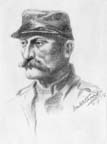
Fig. 32. A French Soldier from the Jura
Still holding and shaking his hand in both of hers, she led us into a bare little room. Soeur Julie and the Admiral seated themselves face to face in front of the window; it was late in the afternoon, and as the light was fading I could only distinguish the silhouettes of their two faces: the nun with her large white coif and the Admiral's clear-cut features. Both faces were remarkable in character. After a few minutes' general conversation, Soeur Julie commenced to tell us her tale of horror: of what she had witnessed. It was strange indeed to hear such peculiarly ghastly details of murder and of rape from the lips of a nun. The story is well known, and it is unnecessary to recapitulate the list of hideous cruelties enacted by the enemy, when they eventually entered the town.
At the conclusion of our visit, on the threshold of her house, the Admiral bowed and gallantly kissed her hand, whilst she, at the same time, patted him affectionately on the shoulder. Behind them, the wall was deeply pitted with bullet holes; it was, in fact, the wall against which so many helpless men had been brutally shot.
The following day it was my good fortune to accompany Lord Beresford to a review of a portion of one of the Brigades of the 'Blue Devil Corps.' He met with a most cordial reception: his handsome face commanded expressions of admiration on all sides. After inspecting the lines of troops, accompanied by the Colonel in command, he stood facing them, whilst the Clarion Band of the Chasseurs Alpins not only played but actually sang 'God Save the King' in English! Then with their characteristic flourish of bugles they broke into the 'Marseillaise.'
In the silence that followed, the Admiral, in token of his admiration of the fitness and renowned valour of the troops, said:
'Well men! after inspecting you, all I can say is, Pauvres boches.'
He could not possibly have paid them a brighter compliment. His words were instantly understood, and they appealed to the Gallic temperament.
* * *
The Admiral, who occupied the best bedroom in our villa by the lake, departed that same evening to visit a neighbouring convoy. The following morning at about four o'clock an enemy aeroplane dropped several bombs in our vicinity. One of them fell within thirteen yards of the front of the house, and another within a few yards of the kitchen. We were thrown from our beds, but sustained no harm. I heard subsequently that when the Admiral was told by telephone about the bombs falling so close to the quarters he had just vacated, and that his bed had actually been smothered with stones and broken glass, his first impulse was to send a telegram to the Kaiser saying, 'Bad shot, Bill.'

Fig. 33. 'Sniper's Corner'
An Exposed Portion of our Main Road to Wettstein
* * *
In honour of the occasion of the King's birthday last year, we made an effort to entertain our French comrades. The General of the Division was one of the first guests to arrive. His visit was the greater compliment to us, for it was seen that he was still suffering from deep emotion. He had lost two sons, killed in the war, the second one falling only a few days before. Frank Hargreaves, who had succeeded Percy Tarbutt, made a suitable speech, and the General's sympathetic reply was received with great enthusiasm. It was an unusual gathering, an interlude in the great struggle that was taking place a few miles away.
* * *
Of all our many French friends at Gérardmer, no one was more heartily welcomed to our quarters than 'The Man with the Dog.' He was a man past middle age, clad as a brancardier, and was accompanied at all times by his faithful dog. Of distinguished appearance, with charming manners, he spent his time among the mountain trenches where, with the aid of his dog, he searched for wounded in exposed and out-of-the-way places. His only son had been killed in the war. He was broken with grief, and sought relief in saving the lives of others.
Possessing large properties, in the centre of France I believe, he was generally known among the soldiers in the trenches as 'The good millionaire.' We never knew his name. He spoke perfect English, and seemed to take pleasure in his conversations with us. Careless of his life, his brave heart led him into taking undue risks. We were, all of us, keenly touched when we received news of his death. The good man was shot through the head, and from that moment his beautiful dog was never seen again.
* * *
One day we received an order to send an ambulance in haste to bring in a wounded officer. It transpired that he was a cavalry officer; before being placed in the ambulance he insisted upon patting his horse, to whom he was much attached. When the motor ambulance started away, the horse pawed the ground and whinnied; then he broke loose from his attendant and started to gallop after his master.
* * *
Whilst Tarbutt and I were floundering about in the mud one dark night, helping the loading of our ambulances, we kicked against a soldier's pocket-book. It was a leather portefeuille. that most cherished of all a soldier's possessions. We took it into a dug-out, and by the light of a few matches we searched for the man's name. As we turned over the papers, we were impressed by a battered photograph representing a sweet-faced woman with a baby in her arms.
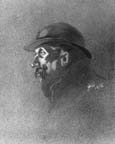
Fig. 34. A Type of French Soldier: a Veteran
The following day we made every effort to restore the book to its owner, knowing well how much it meant to some poor chap. We hoped to find the owner among the wounded we had brought in the previous night, and visited the various Postes and hospitals; but we met with no success. Then, by chance, we spoke to a passing surgeon, who replied:
'How strange. Why, I have the man in my care, a bad case. I remember his name---Colerier, because it reminded me of cholera.'
There was an expression of pure joy on the man's poor face as he said: 'Merci, mon lieutenant, merci,' when the cherished book was laid on his pillow.
We were often thanked by the simple graceful word Merci, when we transported a wounded man into the hospital. I remember one man, however, who showed signs of anger, and, in his peasant patois, he roundly abused everything he could think of, from the Government downwards. We delivered him over to the medical authorities, and the next day I visited him, being interested to know the reason of his outburst of temper. I found him still spluttering and saying:
'This is the fourth time I have been knocked out, and I expect I shall be hanging about down here in the midst of all these people in painter's blouses for at least a month.'
He added a few other expressions, which it is not necessary to translate, but I thoroughly admired his spirit. This was by no means an isolated case of men grumbling at being brought to the hospital. Their hearts were in the trenches, with their comrades, and even when wounded they often resented being taken away from them.
* * *
The wounded always showed a sublime endurance of pain, and they were incredibly patient. Courage, shown by wounded French soldiers, seems to have something almost supernatural about it. On every side where we met with wounded men, there was always an expression of gladness at seeing us and a ready eagerness to shake hands, if their wounds permitted, but seldom a word.
In our No. 3 Section, during the time I served with it, we carried upwards of twenty-eight thousand wounded men, and each of these men, without exception, behaved with amazing courage. It would be difficult, I think, to pay any higher tribute to the fortitude of Mr. Poilu.
* * *
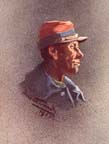
Fig. 35. A 'Fantassin' (Infantry)
It is highly gratifying to realise the large number of valuable lives that have been saved owing to the organisation of the British Ambulance Committee. Under the energetic management of Mr. Bradby Peyman and Mrs. Baker, and supported by voluntary gifts, the system of British Ambulance Convoys, without mentioning the equally good efforts of the American Ambulance Corps and others, has been of incalculable benefit to suffering humanity. The great work has been conducted by volunteer officers-men of different ages and degrees, and of various professions.
The British Convoy No. 3, to which I was attached, stationed last year at Gérardmer, was most ably captained by Percy Tarbutt. He was subsequently succeeded by Frank Hargreaves, who also proved himself to be a highly popular leader. We were a party of perhaps twenty volunteers, and I can never forget the unfailing kindness and spirit of loyal devotion of my comrades. At any hour of the day or night they were ever ready to go in search of wounded.
Our work was principally at night, because a considerable portion of our road was exposed to the view of the enemy. Our route followed a long line of communication over the high summits of the Vosges into the conquered territory in Alsace. Although we were continually in the midst of shell and rifle fire, our casualties were surprisingly small. There are, in that far-off corner of France, however, some British graves which contain the remains of our comrades who fell, dying in a noble cause. There are also several men who sustained injuries and wounds. Their scars will always remind them of their worthy mission.
 Fig. 36.
'Our work . . . at night . . . under shell and rifle fire'
Fig. 36.
'Our work . . . at night . . . under shell and rifle fire'
We were invariably treated with the utmost kindness by the French whom we had come to assist. From the General to the simple peasant soldier, every one greeted us as friends. On our side, we all of us felt that we were privileged in being allowed to join them, and were grateful to the French for permitting us to witness their splendid qualities: to carry the body of a wounded soldier was regarded by us as an honour.
Anxious to convey our sentiments to our French soldier friends, we conceived the idea of composing a little monthly journal. The first number, laboriously written in long hand, contained an open letter to the French. It was very gratifying to us to see the open letter reprinted in that most famous of all trench journals, Le Diable au Cor, printed and published at the front, not far from Gérardmer, by the 3rd Brigade of the Chasseurs Alpins, October 10, 1915. The letter is as follows:
AUX FRANÇAIS
Salut, nos frères français! Et dans ce salut nous mettons tout notre respect, tout notre coeur. Sachez que, lorsque l'idée nous vint de rédiger ce petit journal, nous y vîmes une heureuse occasion de communiquer avec vous, de vous dire ce que nous sentons, de vous faire comprendre ce que notre différence de langue nous a empêché de vous exprimer jusqu'ici: combien nous vous aimons, combien nous vous admirons, que notre vie toute entière est à votre service, animés du seul désir de vous être un peu utiles. Vous connaissez la villa où votre générosité nous hospitalise. C'est là, le soir, après le dîner, dans la lumière et le confort, qu'une trentaine de vos amis anglais attendent de pouvoir monter à votre secours. Ils chantent de vieux airs du pays; ils se racontent des nouvelles de leur Patrie, quand, soudain le ronflement du moteur vient dominer la musique et les voix. C'est l'ordre du départ, et, quelques instants plus tard, la salle est vide, silencieuse; seule, y flotte encore la fumée des cigares, et les journaux traînent sur la table. Nous sommes sur la route . . . nous montons à W ... sans bruit, sans lumières, et nous nous retrouvons dans la nuit, dans le froid ou la gelée.
Vous, vous êtes tous les mêmes, pas une plainte, pas un cri, et devant la façon héroïque dont vous supportez les pires douleurs, nous voudrions nous exclamer, vous dire notre admiration, mais votre courage est si spontané, si naturel, que nous restons muets: du reste, vous ne nous comprendriez pas, alors . . . alors nous nous bornons à vous prendre aussi doucement que possible et à vous emmener bien vite vers le calme et les soins, nous ingéniant à éviter les trous de la route, les secousses et les heurts dont nous souffrons tant à la pensée que vous les subissez. Et quel bonheur de vous savoir quelques heures plus tard installés dans un de ces confortables hôtels où nous vous avons distribués, où l'on va guérir votre mal.
Le lendemain, pour nous rappeler encore votre glorieux souvenir, quand le soleil nous réveille, il vient frapper sur nos brancards le sang que vous avez perdu; il le fait rougeoyer, briller, étinceler, et ces sanglants rayons sont ceux de la Victoire dont vous payez si généreusement, si vaillamment le prix.
Merci pour Elle, amis Français, Merci. . . .
.
BEHIND THE CURTAIN
DURING three weeks I lay in a military hospital scarcely able to move, with my right leg enveloped in a plaster-of-Paris mould. This incident at least afforded me an opportunity to realise the difference between merely visiting a hospital and being a patient. It gave me also cause to be deeply grateful to Dr. Fournial for his skilful treatment, and also to Mademoiselle Jeanne de Johannis for her extreme kindness in looking after me. Here was an opportunity, moreover, for observing the extraordinary devotion and the loving care bestowed upon the wounded men. I saw that the personnel of the hospital never rested. There was continual movement day and night; wounded men were brought in at all hours. Operations were performed continuously. The latter fact was brought home to me because the operating-room was just below where I lay, and I was, at all times, conscious of what was taking place. One night there was more noise than usual, and I was surprised to hear an angry gruff voice raised in protest. Shortly afterwards the nurse came to me, and said in somewhat discouraged tones:
'Oh, this war, it makes brutes of men. Just now I wanted to wash the hands of a man who had to be operated upon; he refused and became violently angry. He said, " No, my hands are covered with the blood of a boche Colonel. I killed him myself, and I refuse to have the blood washed away.`
* * *
Very early one morning I was startled by hearing a baby crying. I had become accustomed to almost every other sound, but this was unusual and at once excited my curiosity. I recognised the voice of Mademoiselle de Johannis saying to a woman:--
'You are here already? I did not expect you so soon, you did not waste any time.' Then I heard a peasant woman's reply:
'Oh no, madame---see---I still wear my apron. When they gave me your telegram to say that my man was wounded., I took up my baby and came at once. I have been twelve hours in the train, and I have never travelled anywhere before.'
She was taken to her husband, who lay in the next room to mine, in a very grave condition, his lungs perforated by shrapnel. Even now I still recall the sounds in that next room, only divided from mine by a shallow partition: I hear the baby's plaintive cry, the woman's sobs, the man's desperate struggle to breathe.
* * *
From my bed I was able to see out of a window. The main road passed directly in front of the hospital, and on the opposite side were a few pine trees, which served as cover against aeroplane raids for a group of artillery ammunition wagons. At intervals, artillery drivers would hitch up their horses to one of the wagons and gallop away with it in a cloud of dust. The next incident would be the arrival of one of our motor ambulances, bringing in the wounded from the front, and I could see poor mangled bodies, swathed in bandages, being carried in on stretchers.
But I was most attracted, I think, by the figure of an old grey-haired lady, who arrived each morning at dawn carrying an old blue umbrella. She stood through the whole of each day awaiting the arrival of the wounded, and as each man was drawn from the ambulance she manoeuvred her umbrella in such a way as to shield his eyes from the glare of the sun. She rendered a great service; a simple kindly act of true devotion. She understood.
* * *
Among a fresh consignment of wounded arriving one morning was a young sergeant who, in civil life, was a Paris lawyer. He was a particularly handsome young fellow, and in spite of a serious wound in the head he impressed every one by his attractive manners. Upon recovering consciousness from a serious operation, he implored the surgeon to telegraph to his mother and sister to come to him, and showed great anxiety for their arrival. Continually he asked if any reply had been received. In a few days paralysis deprived him of the power of speech. He then used a pencil, and wrote on scraps of paper, asking for news. By degrees he became entirely paralysed and unable to move. Still he indicated his eagerness by gazing fixedly at the door through which he hoped his mother and sister would come; and it was in this position, a few days later, that he died. His mother and sister never came; they were prisoners in invaded territory!
* * *
A man straggled into the hospital one day, saying that he had walked in order to leave room in the ambulance for those more seriously hurt. He said his wound was really nothing; he had been shot in the head! When his turn came to be examined, he climbed unaided on to the operating table, but the moment he lowered his head and lay in a horizontal position, he died. The bullet had entered his brain, and the change in position brought on haemorrhage. One of a hundred incidents showing the spirit of the French soldier.
Upon another occasion a mere lad was brought to, the hospital, complaining of a violent headache. It was a busy time just then, and his case was not considered serious; particularly as he explained that the pain was caused by a knapsack falling on his head in the trenches. When his turn came, and he was examined under the X-rays, they found a bullet embedded in the very centre of his brain.
* * *
Considering the enormous strain of living for months at a time under continuous shell fire in the trenches, it is remarkable that there were so few cases of men losing their reason. I only heard of two or three mental cases among the many thousands of wounded men who were carried by our ambulances. One of the cases was that of a brave Poilu who had passed through a fierce hand-to-hand fight, and it was said that he had acquitted himself in a very remarkable manner. Exactly how and when he lost his reason will never be known, but the memory and the effect of his effort remained with him. He always imagined himself to be in the thick of a fight, and was for ever, jerking his arms, the gesture of a man trying to free his bayonet after use.
* * *
Once I spoke with a man supposed to have made a remarkable recovery. He told me that a strange thing had occurred to him. He was wounded in a charge, and fell in front of the enemy's trenches. Whilst lying helpless on the ground, with stiffening limbs, he suffered intensely from thirst. Seeing his sergeant coming towards him, he asked for a drink of water, and then went to sleep feeling greatly refreshed. The following day the same thing occurred. When he was eventually rescued, he discovered that it had all been a dream. During the two days and nights that he had lain on the ground in front of the enemy, no one had been near him!
* * *
It occurred to me that the hospital in which I lay would serve as a valuable object lesson from the point of view of what can be accomplished by a handful of efficient and loyal people. There were sometimes upwards of eighty patients, many of them requiring great care and attention. The staff of this hospital consisted of Dr. Fournial, Médecin Chef, and an aide; one nurse, Mademoiselle Jeanne de Johannis, who was on duty night and day, and had, in fact, worked on this system since the outbreak of the war; and four orderlies, one of whom in civil life was a priest. The entire kitchen arrangements were conducted by one man, a worthy character to whom I would also like to pay a passing tribute. In civil life he followed the profession of a 'sword swallower' in a travelling circus.
* * *

Fig. 40. No Man's Land'---Wettstein: October 1915
Late one night, about midnight, Mademoiselle de Johannis came and asked me to lend her my electric torch. An hour or two later when she returned it, she said that she had been With her sister, the chief nurse of the Casino hospital, to gather some wildflowers to place on the bodies of men who had recently died, and who were to be buried the following morning at dawn. Surely a beautiful picture. I imagined I could see the two white-clad figures of those noble sisters stumbling about the hillside, seeking wildflowers; the sweetest imaginable symbol of true sympathy. The little drawing below was made as I lay in bed, after she left my room.
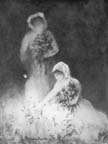
Fig. 42. '. . . the two white-clad figures . . '
* * *
Though my stay of three weeks in that hospital was somewhat marred by the physical discomfort of my injury, the opportunity I had of observing such true devotion and efficiency more than compensated me.
When my kind friend, Paul Gérard, came to convey me in his car to Paris, for a medical consultation, I felt keen regret at leaving the companionship of such noble people.
.
THE WOMEN OF FRANCE
IF it be accepted as a truth that the home makes the country, necessarily it must be allowed that the mother makes the home. Therefore it follows that the greatness of a nation is not to be measured by either wealth or commerce, but by the character of its women.
The French woman is famed all over the world for her efficiency, and since the outbreak of war her reputation has been more than justified. Her charm and grace, her remarkable quality of understanding distinguish her from the women of any other country. Children, as they grow up, regard their mother as their best companion and friend; they tell her everything naturally and without concealment. The father enjoys his home, because his wife is his best friend. The influence of the French mother is beyond words. She is a wonder.
At the outbreak of war I witnessed many different aspects of the mobilisation of troops, and I was struck by the stoicism of the mothers and wives of the soldiers. Many of them wept, but they gave up their men bravely. Immediately afterwards, they nerved themselves to face the situation, finding fresh courage even in the very weakness of their womanhood. They seized every opportunity offered in the sweet work of doing good. Not only did they work by organising their qualities of mercy, but they faced gladly the sacrifice of overwork and overstrain, leading in many cases to the loss of health and life itself.
* * *
It is not my wish to indulge in platitudes or in generalities. It is more in accord with my temperament to relate the incidents as they came within my experience. and to let others form their judgment of the moral.
A friend of mine who had some official connection with the case, related to me the story of a poor girl who had been found dead in her room. The official inquiry recorded that the girl was formerly a seamstress, engaged in a large dressmaking establishment in Paris. She had saved the sum of £10 from her earnings and, anxious to provide warm garments for the soldiers in their winter trenches, she spent the entire amount in purchasing wool. In her spare moments, after her hard day's work was done, she worked diligently with her knitting needles. Through lack of patronage, the dressmaking establishment was forced to discharge its workpeople, and this poor girl found herself penniless and without employment. Still she continued working for the soldiers and deprived herself even of the necessities of life: she became ill and died. They found her in her poor room, dead in her chair, the knitting needles still in her hands. That is the type of French woman who is indeed worthy to be the sister of a French soldier.
* * *
At Gérardmer last year I met with an incident which gives colour to my previous statement relating to the French woman's instinct and quick understanding. A case occurred when it was urgent that an operation should be performed immediately, but owing to unforeseen circumstances, it was found impossible at that moment to obtain any kind of anaesthetic. The surgeon was much distressed, for the operation was a grave one. The only hospital nurse in the place took in the situation at a glance. Leaning forward, she gently kissed the wounded man and placed her cheek caressingly against his, with her arm round his head. The face of this poor brave man lit up at once with a gratified smile, he understood and submitted to the operation with remarkable fortitude.
* * *
I once overheard a conversation between two soldiers in the trenches. One of them had received a letter from home, and he quoted certain passages, to the effect that an officer had come to the house of one of his neighbours to bear the news of a son's death. In an effort to calm the poor mother's emotion, the officer told her that she should always remember that her son had died in helping to save France.
'Ah,' she replied,' only tell me, Monsieur l'Officier, that we shall save France, and I will cry no more.'
* * *
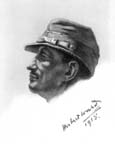
Fig. 44. A French Soldier Type
Instances of charity and self-sacrifice among the French poor are so numerous and of such common daily occurrence as to become mere incidents in ordinary life. I have seen a poor old woman distribute her entire stock of fruit from her barrow among a company of soldiers who were marching to the front. I know of a charwoman who contributed £100, the savings of seventeen years of hard work, in one gift to an ambulance fund.
An old couple, living in great poverty, invited an officer's widow to come and bring her four children to live with them.
'We can manage,' said the old lady, 'we are so fond of children, and if you will join us with your family, we will economise. It is so easy---for instance---my good man now smokes four pipes of tobacco a day; if you will come to us, in future he will only smoke once a day.'
* * *
There are two great and good qualities, among many others, for which the French are particularly distinguished: self-denial and economy. Throughout France, we meet with these characteristics. The French are in no way prompted by miserly instinct to deny themselves and to save their money: they do not labour long hours and practise thrift and economy for any unworthy love of hoarding money. The great and sacred object of their efforts is to keep in view the welfare of their children. French parents are passionately devoted to their children. In fact, the catastrophe of the declining birth-rate is in close connection with this popular ambition to benefit their children. According to the Civil Code of France, the testamentary distribution of property is legally confined within the family; this produces the natural reasoned result that the fewer the children, the greater is each share.
* * *
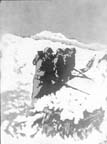 Fig. 45.
Reconnoitring, behind a Snow Bank
Fig. 45.
Reconnoitring, behind a Snow Bank
Whenever I felt unduly depressed, when the memories of things, seen and felt, weighed heavily upon my mind, I always found comfort in visiting Soeur Claire, the Sister Superior of the Orphelinat at Gérardmer. I was drawn to her not by religious ties, but in the cause of pure humanity. She would receive me in her bare little reception room, always with a smile.
She was an old lady approaching eighty years of age. Her lower limbs were paralysed and her hands were sadly misshapen by rheumatism. With a charming simplicity, she would speak of people's kindness to her in her life's work. To her sweet mind the world appeared peopled only by gentle-hearted men and women. If by chance, hearing a heavier cannonade than usual, we were drawn to speak of the Germans, she used to close her lips firmly and shake her head in pity. Her face was unusually beautiful in its expression; each line and curve bore the trace of a life devoted to kindly thought of others.
Once, encouraged by her sympathy, I ventured to show her the photographs of my family---she pressed each photograph to her lips and asked me to leave them with her just for the night, without explaining the reason. The following day, when she returned them to me, she kissed me on both cheeks, and said: 'We have asked God to protect your two soldier sons.'
* * *
At early dawn each morning there occurred the sad function of burying the bodies of soldiers who had died in the various improvised hospitals during the night.
There was even more than the sad ceremony itself, because one's heart was touched in a double sense: there was the natural reverence for the brave dead, and there were the sympathy and remembrance one felt for the families who were all unconscious at that moment of their dear one's fate. Knowing something of French home life, I found my imagination passing beyond control in forming vivid pictures of what was passing at that moment in far-off homes, among widows and orphans, who were yet to learn the tragic news of their bereavement.
Following the procession of stretcher-bearers with their sad burdens, there was yet another heart wrench---twenty or thirty little girls, dressed uniformly in black hats and capes. They were the lonely parentless girls from Soeur Claire's Orphanage.
'What can be more fitting,' Soeur Claire said to me, than for these children who are already parentless, to stand proxy for those men's children, and to represent them at their father's graveside?'
 Upon
one occasion only was their absence remarked. It was bitterly
cold that morning, and the ground was sodden by several days'
incessant rain. The poor children's boots were thoroughly worn
out and Soeur Claire was fearful lest they might suffer from exposure!
Upon
one occasion only was their absence remarked. It was bitterly
cold that morning, and the ground was sodden by several days'
incessant rain. The poor children's boots were thoroughly worn
out and Soeur Claire was fearful lest they might suffer from exposure!
Fig. 46. Mud!
The Orphanage is very poor, so poor that the Mayor of Gérardmer, from his scanty resources, has made them a grant of one penny a day for each of the sixty children.
They live within the never-ending sound of artillery fire; each morning is devoted to attendance at the burial service for the dead. Their days are spent in strict seclusion, and their nights are passed in natural terror of bombs being dropped from enemy aeroplanes.
Poor little children! Their normal childhood joys are thus suddenly turned into the tragic realities of life, and not only are they deprived of childish freedom and liberty of action, but their poor little souls are for ever clouded by what they witness daily, of the arrival and suffering of wounded men directly from the front, and of the interment of fallen soldiers. Their youthful minds are tortured with the knowledge that all around them is one great continuous effort, to the abandonment of all else---the struggle to save France from cruel invasion.
The kindly faces of the Sisters and the gentle, if subdued, faces of those poor little children tell their story. Whatever their physical privations, they are, in the highest sense of the word, sublimely happy.
* * *
Everywhere there are daily proofs that the spirit of Jeanne d'Arc still flourishes in the hearts of the women of France. Those brave hearts, bearing the racking strain of anxiety, are in every way as brave and as staunch as those of their bravest men. Instances of self-sacrifice, of silent heroism and courage abound on every side.
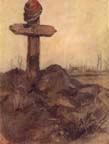
Fig. 47. The Grave of a French Soldier
Truly, in war time, it is the woman who bears the hardest portion.
This spirit of woman's bravery is well indicated by an incident at the railway station of Dijon, in November of last year.
Crowds of relatives had gathered to await the arrival of a hospital train, coming from the front. When all the wounded were withdrawn from the train, mostly on stretchers, a young woman carrying a baby came forward to inquire for her husband. She was informed, with every mark of sympathetic respect, that her husband had died of his wounds the previous night.
The young woman, at first stunned with grief, quickly recovered herself, and raising her baby above the heads of those who came forward to condole with her, she cried, in a faltering voice:---
Vive la France!'